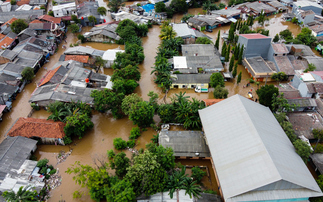Pacific state vows to slash greenhouse gas emissions 32 per cent by 2025 and calls on other countries to back 'expiry date' for fossil fuels
The Republic of the Marshall Islands has become the first island state to submit its official climate action plan to the UN, revealing how it aims to cut emissions by 32 per cent by 2025 against 2010 as part of a plan to become emissions-free by the middle of the century.
The strategy document, known as an INDC in UN jargon, also includes a commitment to cut emissions 45 per cent below 2010 levels by 2030. But the RMI's government stressed that it has opted for a 2025 and a 2030 target in a bid to increase pressure on other countries to adopt shorter-term goals that would make it easier for states to increase ambition in the mid-2020s if necessary.
"The preference for a 2025 target is consistent with calls by the US, Brazil and the world's most vulnerable countries for shorter five-year commitments to avoid locking in insufficient ambition all the way to 2030, some 15 years away," the government said in a statement. "It will strengthen calls from a growing majority that all countries must come back to the table by 2020 to see if stronger action is possible, particularly as renewable energy and other low-carbon technology becomes cheaper and more efficient."
The move came on the same day as the French hosts of the upcoming Paris Summit called on ministers gathered in Paris this week for a preparatory meeting to focus on delivering a concise but flexible agreement for cutting global emissions.
RMI also opted for an absolute emissions reduction target, setting it apart from many developing nations, which have promised to cut emissions intensity or reduce emissions against a hypothetical business-as-usual baseline.
"Having an absolute economy-wide target means no-one has to look into a crystal ball to understand what it means for how much CO2 goes into the atmosphere," said RMI's president Christopher J Loeak. "Unlike 'below business-as-usual' and 'GDP-intensity' targets, our numbers don't rely on unknown variables like size of population and future economic growth. This is the simplest and most robust type of target that the country can adopt. It says 'we mean business', and we're not continuing with 'business as usual'."
He added that the country's plans through to 2025 and 2030 supported its over-arching goal to become a net zero-emission economy by 2050.
"With these ambitious targets, we are on track to nearly halve our emissions between 2010 and 2030, en route to becoming emissions-free by the middle of the century," he said. "The science says this is what's required globally. We have now joined the US, the EU, Ethiopia and others in setting a long-term decarbonisation strategy. When added together in Paris, these strategies will stamp fossil fuels with an expiry date."
Loeak's comments were echoed by RMI's minister of foreign affairs, Tony de Brum, who is attending this week's ministerial meeting in Paris.
"Despite the costs of climate change spiralling out of control, we have once again shot for the upper end of what is possible with our limited resources and international support," he said. "Since the 2008 oil price shock, the Marshall Islands has embarked on one the world's most aggressive rollouts of renewables and energy efficiency measures."
He added that having peaked emissions in 2009, the country would now step up investment in a range of renewable energy technologies, including solar, biofuels, wind energy, and innovative Ocean Thermal Energy Conversion (OTEC) systems.
"If we can show OTEC to work in our waters, it could change the global energy landscape altogether, delivering clean, green power to big coastal cities all over the world," he said.
De Brum also issued a plea for larger nations to deliver more ambitious emissions reduction plans. "With most of the big emitters' targets now on the table, everyone knows we are falling well short," he said. "This is not something that can be ignored, nor swept away by political expediency. There can be no more excuses for delay or for low-balling ambition on the false premise that coal and other dirty fuels somehow increase prosperity. Exactly the opposite is true. Our message is simple: if one of the world's smallest, poorest and most geographically isolated countries can do it, so can you."
The RMI's submission comes as a host of nations prepare to submit their INDCs ahead of the crucial Paris Summit in December. In recent months, the US, EU, China and South Korea have submitted their plans, while last week saw Japan commit to cutting emissions by 26 per cent by 2030 against a 2013 baseline.
This article featured on BusinessGreen's Road to Paris hub, hosted in association with PwC









